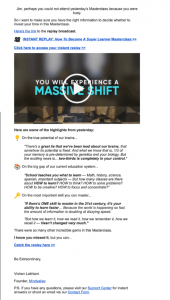— August 25, 2017
Manage your interview part 2
As a candidate, you need to manage your interview. Last weeks post was on the topic of overcoming a recruiter that didn’t make use of follow-up questions. Many candidates have a solid skill set that fits the job description. Unfortunately, if the candidate doesn’t know how to control the person conducting the interview, they may not move them forward. The recruiter needs to leave the interview with proof points that you can do the job. Candidates are passed over on a regular basis because the interviewer asks a question and not knowing the meaning behind the question the candidate provides the wrong answer. The interviewer doesn’t follow-up with additional clarifying questions and assumes the worst. I received a number of great questions via email regarding last week’s post and thought a second post with an additional example would be helpful.
The goal of last weeks post was to point out that a number of great candidates are declined because the person conducting the interview isn’t asking follow-up questions. The question isn’t asked a second time in a different manner in an attempt to bring clarity to the candidate. We don’t want the interviewer to stand in the way of a great opportunity so we need to take control of the interview. We don’t want to leave the results of the interview in the hands of the interviewer.
The FAIL
A typical example of a great candidate failing an interview answer is below. Based on the candidate’s answer, this candidate would probably be passed over. This phenomenon isn’t limited to this particular question. It can happen with any interview question.
Interviewer:
How do you handle stress?
Candidate:
Handling stress isn’t a strength for me.
At this point the interviewer is thinking: “Well this candidate isn’t going to work out. We have a stressful job. Why does the dumb ass recruiter keep sending me these candidates who are not qualified?”
This short exchange is a typical conversation during an interview and frankly, the candidate let it happen. The candidate shot their self in the head. As candidates, we need to manage the job interview.
Hypersensitive manager
Because the last person in the position didn’t handle stress well, the hiring manager wants to make sure that the next person in the position does handle stress well. The hiring manager is focused on this qualification and hyper sensitive to it. As soon as they hear an inkling that there is a deficit in this particular skill, the interview is over.
Boyfriend / Girlfriend example
Let’s say we have a couple that has been dating. They have gotten serious but there is one problem. The girl REALLY likes to watch football and the guy just isn’t into sports. The girl wants to watch football on Sundays in her jersey and wants to spend a lot of money on season tickets. There are football pools at work and Fantasy Football leagues with friends. Finally, the dude says “enough”. Your football is more important than I am. Your football BFF’s spend more time with you than I do.” He walks. You can bet your ass that the NEXT boyfriend is going to check the “I really enjoy football” box. ” Her dream guy will have Seattle Seahawk sheets and pillow cases, tailgate in season and have a life-size poster of a player in their room. This candidate won’t just say “I like football”. You are going to get the idea pretty quickly that this guy REALLY likes football.
The behavior to surround ourselves with folks who will help us become successful is just human nature. This is why we need to be pro active with our interview answers.
An effective recruiter has a different conversation
Interviewer:
How do you handle stress?
Candidate:
I don’t handle stress well.
Interviewer:
Can you give me an example of when you were stressed?
Candidate:
I am stressed now. I just graduated and am looking for a job. My mom has cancer and I am still trying to work 30 hours a week. It’s just stressful now. My mom will be OK in the end, but I just don’t like to see her go through the treatments. I used to go to the gym 4 days a week and now I just go on Tues, Thurs to relieve stress. Under the circumstances, I am stressed but in the grand scheme of things, I know that I am doing as much as I can and there are some things out of my control.
This interviewer uncovered someone who is having a tough time and is in a stressful situation. The interviewer also used Behavioral Interviewing techniques to dig deeper. In this case, the interviewer found an example of prior success with a potentially strong candidate who is taking extra measure to handle stress. This answer paints the candidate in a very different light versus the first conversation.
The above is an actual conversation from an actual interview. That candidate was hired and because they knew how to deal with stress. They proved to the hiring manager’s that stress is relative and they took steps to handle stress.
Why is this interview question being asked?
As candidates, it can be easy to feel like we need to be respectful of the interviewer’s time and provide short concise answers. This type of answer tends to lack emotion. Short answers that are straight to the point usually do not build any rapport. As candidates, we need to anticipate that if someone asks about the following, it is important. Ask yourself the following about all interview questions:
Why are they asking this question? They wouldn’t ask the question if it wasn’t important? What do I need to show them as it relates to this question?
If you are asked about your Excel or Microsoft Office skills, we need to elaborate on what we know. Just saying “Yes, I know Excel” or even “On a scale of 1-10, I am a 10” isn’t enough. Your “10” may not be another person’s 10. You may be an expert at graphs and sorts, but the hiring manager may need formulas and pivot tables. If you are asking “A pivot what?”, we are not a 10. The way we answer this question is by being more specific. “On a scale of 1-10, I consider myself a 9. I am good at graphs, pivot tables, and joins. I feel good about my Excel game”
Corporate Life is a Game, Win It!
Business & Finance Articles on Business 2 Community
(121)
Report Post





